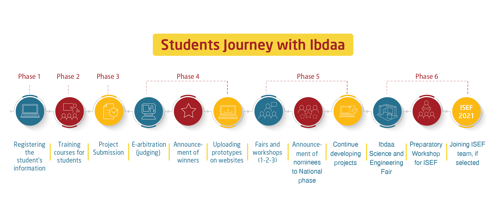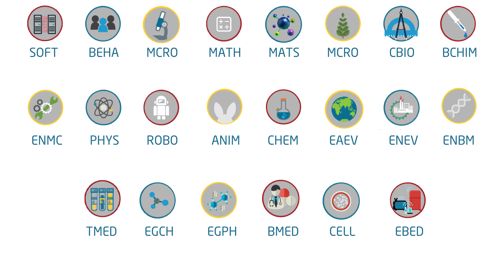Introduction
In fulfillment of the Vision 2030 of the Kingdom of Saudi Arabia, with the goal of a prosperous economy and a fruitful opportunity by providing education that contributes to advancing the nation. One of the work commitments is the "focus on innovation in advanced technologies and entrepreneurship and in line with the tenth development plan, to transform that into society. The National Olympiad for Scientific Creativity "Ibdaa" seeks to create a competitive, creative scientific environment that stimulates the mind of a pre-college scientific researcher. It also prepares them for competition and entry into the global knowledge system based, on innovation and scientific research to achieve sustainable national development.
Ibdaa has embodied distinction and creativity at the local and international levels by the hands of the sons and daughters of the nation through distinguished scientific projects throughout the past 11 years. The achievements continue now in creativity with full potential and is organized by the Ministry of Education and the King Abdulaziz and His Companions Foundation for Giftedness and Creativity "Mawhiba". It is part of the implementation of the education policy in the Kingdom, with the goal to encourage and develop the spirit of research and scientific thinking, and to consider to global achievements in the fields of science and knowledge.
National Olympiad for Scientific Creativity - An Introduction
It is an annual scientific competition based on competition in one of 21 scientific fields and is implemented through the submission of individual scientific or engineering projects, according to International standards and controls.

Ibdaa Science and Engineering Fair
An exhibition to select the winners in "Ibdaa", from whom represent the Kingdom at the International Science and Engineering Exhibition "ISEF" in the United States of America.
The Scientific Project
It is the study of a problem to solve based on precise scientific rules, and it is a way to ask questions and scientifically answer to them by observing and doing experiments and providing results. It is organized scientific thinking carried out by a person called the researcher to investigate facts about a particular issue or problem called the subject of scientific research. This is implemented by following an organized scientific method called the scientific research method, with the goal of reaching appropriate solutions for applications or to validate results for generalization to similar problems called results of scientific research. This will prove or deny the hypothesis and this research may lead to an engineering design that requires creative work.
Goals
-
Provide a competitive environment that satisfies the interest of the nations' sons and daughters.
-
Develop the creative spirit among students in the scientific and technical fields.
-
Discover the scientifically talented students.
-
Provide students with scientific research skills and to provide the development of their scientific talents.
-
Represent the Kingdom of Saudi Arabia in international forums with distinguished projects.
-
Embrace students' creativity to reach solutions to solve global sustainable development problems.
-
Teach creative students about the importance of the economic impact of scientific research.
-
Transform students' projects into usable manufactured models.
Students Journey with Ibdaa
Phase 1: Registering the student's information
Phase 2: Training courses for students
Phase 3: Project Submission
Phase 4:
-
E-arbitration (judging)
-
Announcement of winners to the next phase
-
Uploading prototypes on websites
Phase 5:
-
Fairs and workshops (1-2-3)
-
Announcement of nominees to National phase
-
Continue developing projects
Phase 6:
-
Ibdaa Science and Engineering Fair
-
Preparatory Workshop for ISEF
-
Joining ISEF team, if selected


